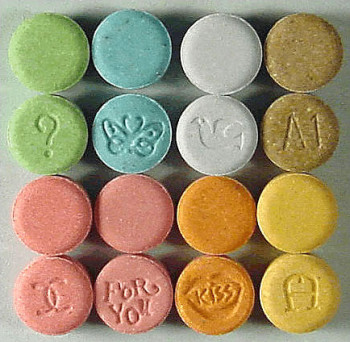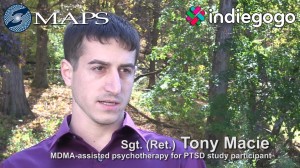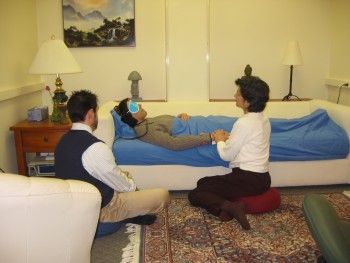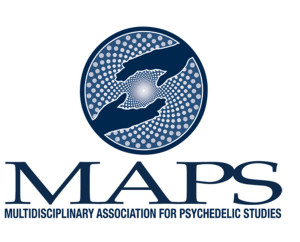A change is coming to the field of mental health and it’s not what you might expect. Given current trends, it would not be imprudent to assume that this change might include better step-by-step workbook protocols able to be administered by computers for short-term care and backed by the research of health insurance companies, but it’s not. Instead, on the very near horizon is the reemergence of the rich, wild, and incredible world of psychedelic-assisted psychotherapy. Let us start at the beginning . . .
The Birth of Psychedelics in Mental Health
The term Psychedelic was first suggested by the psychiatrist Humphry Osmond in 1946 to describe the properties of Albert Hofmann’s recent discovery of Lysergic acid diethylamide (LSD). The term comes from the Greek words psyche—”mind”—and deloun— “to make visible, reveal.” In other words, the term psychedelic is referring to that which reveals the unconscious mind and makes visible the invisible. This class of substances, which contains compounds such as LSD, psilocybin and MDMA (Ecstasy), induce a vast array of experiences including states of universal connection and love, oneness or “selflessness,” and the revealing of hidden beliefs, feelings, and traumatic memories.
Psychedelics, in the form of naturally occurring plant compounds such as mushrooms containing psilocybin, have been experimented on and used for thousands of years by indigenous cultures across the world for spiritual, emotional, and physical healing. Psychedelics did not enter the field of psychology until the 1940’s when research started on the recently discovered synthesized substance LSD. Most of the research done on psychedelics, including psilocybin, was conducted from the late 1940’s until the federal ban in 1968 of LSD, and then the ban of MDMA in 1985. Some experiments were done by the military to study the use of LSD for mind control, however the bulk of the studies were done in the psychological community, including the pioneering work of Dr. Stanislav Grof. Due to federal restrictions, for the last 20 years research has been extremely limited to non-existent, that is until now.
Over the past few years the U.S. government has begun to relax its restrictions on such substances and given limited access to select groups of researchers. Some such groups have focused on end of life anxiety as with the N.Y.U study focused on psilocybin and terminal cancer patients. Others have focused on trauma recovery, such as the Multidisciplinary Association for Psychedelic Studies (MAPS) study going on right now in Boulder, CO. Let’s take a closer look at the latter in order to get an understanding of just how powerful these substances can be used in a healing context.
The MAPS Trials
 In Boulder, CO, MAPS has focused on MDMA-assisted psychotherapy for the treatment of Post Traumatic Stress Disorder (PTSD) and has already achieved some incredible results. Here is how Saj Razvi, the Executive Director of Trauma Dynamics and a sub-investigator for the Phase 2 MDMA Maps trial puts it, “The phrase ‘game-changer’ in describing how MDMA-assisted psychotherapy will alter the field of mental health is not hyperbole; it is backed by the quantitative data as well as the qualitative reports we have seen in the clinical research trials.” Raszi goes on to speak about the potential impacts of the Boulder MDMA MAPS trial, which is now beginning phase 3 of its research:
In Boulder, CO, MAPS has focused on MDMA-assisted psychotherapy for the treatment of Post Traumatic Stress Disorder (PTSD) and has already achieved some incredible results. Here is how Saj Razvi, the Executive Director of Trauma Dynamics and a sub-investigator for the Phase 2 MDMA Maps trial puts it, “The phrase ‘game-changer’ in describing how MDMA-assisted psychotherapy will alter the field of mental health is not hyperbole; it is backed by the quantitative data as well as the qualitative reports we have seen in the clinical research trials.” Raszi goes on to speak about the potential impacts of the Boulder MDMA MAPS trial, which is now beginning phase 3 of its research:
As MDMA-assisted psychotherapy enters the mainstream of mental health, we can expect to see . . . an increase in the effectiveness of psychotherapy for PTSD with improved client outcomes, a decrease in the overall duration of therapy, a decrease in overall treatment costs, and potentially a large increase in the number of people seeking treatment.
The Story of Tony Macie
 This all sounds very promising. However, if this feels vague or too good to be true, it may be helpful to take a look at the story of Tony Macie. Macie, a now retired Sergeant of the U.S. Army who spent 15 months in Iraq in 2006-2007, was diagnosed with PTSD when he returned home. The treatment provided by Veterans Affairs proved ineffective and his PTSD symptoms were soon labeled as “treatment-resistant.” Macie began to search for alternative and experimental treatments. He eventually found the PTSD focused MAPS trial for MDMA-assisted psychotherapy and was accepted as a participant. Here is what Macie had to say about his experience:
This all sounds very promising. However, if this feels vague or too good to be true, it may be helpful to take a look at the story of Tony Macie. Macie, a now retired Sergeant of the U.S. Army who spent 15 months in Iraq in 2006-2007, was diagnosed with PTSD when he returned home. The treatment provided by Veterans Affairs proved ineffective and his PTSD symptoms were soon labeled as “treatment-resistant.” Macie began to search for alternative and experimental treatments. He eventually found the PTSD focused MAPS trial for MDMA-assisted psychotherapy and was accepted as a participant. Here is what Macie had to say about his experience:
MDMA-assisted psychotherapy opened the doors for me to compassion, love, and moving on. Instead of trying to forget experiences, I focus on learning from them. It also taught me to see the strength of trauma, but yet not forgetting my fellow veterans. . . I am proud to say that I am no longer on medications, I am able to more fully live my life, and my relationship with PTSD has changed completely.

MDMA-Assisted Psychotherapy: A Closer Look
At this point you might be wondering how MDMA-Assisted psychotherapy actually works and what a session might look like. In one sense, without actually being a participant or a counselor experienced with altered state work, it is hard to truly understand the process. I will do my best to give you at least an idea of how and why it works.
One of the key components to any psychedelic experience is what is known as Set and Setting. In other words, the intentions we bring to the experience and the environment we do it in has a huge impact on the therapeutic benefits of the experience. If for example one takes a psychedelic substance with a vague idea of having an interesting experience in a busy public park, the healing benefits may be mixed. If however that same person brings a clear intention to take a step in recovering from PTSD and does so in a peaceful, calm, and safe environment with a guide such as a trained therapist, the results can be quite different and have lasting positive impacts.
Another important principle of the psychedelic healing experience is the phenomenon of the inner healer. This inner healer has been posited to be a part of our psyche that actually already knows what we need in order to heal emotional wounds. However, in regular everyday conscious this aspect of our psyche may be covered over by fears or habitual patterns of avoiding such inner knowing. Psychedelic-assisted psychotherapy tends to allow a client’s inner healer to emerge and take over the healing process from within, in what can only be described as a “flow.” On this topic Raszi notes that, “As a client’s inherent sanity leads the way, approaches to trauma that follow a step by step structure will not fit with the fluid nature of the mind and body while under the effects of MDMA.” This is not to say that a well trained human guide in the room is not necessary, but that with the help of substances such as MDMA the client’s own innate wisdom is allowed to come forth to greater degrees. Here is what Macie has to say about this subject, “MDMA gives the user the ability to completely relax and trust their inner knowledge to guide them to do what is right.”
MDMA also seems to help overcome one of the central challenges to PTSD treatment, which is the challenge of nervous system dysregulation. When sharing about, and returning to, past traumatic events, clients often find that one memory will trigger another in rapid succession and quickly become overwhelmed by the flood of intrusive memory. When a person suffering from PTSD becomes dysregulated at a certain point they are no longer able to process the traumatic memory and instead can either dissociate and become re-traumatized. It is important to remember that traumatic memories are stored in different brain centers then normal working memory, and when remembered are felt to such a degree that the individual is less remembering and more re-experiencing. According to the research being done in the Boulder MAPS study, MDMA has the power to turn this significant problem in trauma therapy into an asset by allowing traumatic memories to surface without them having the same dysregulating effect. The regulating effect of MDMA allows PTSD sufferers the ability to face their trauma. Macie shares that, “I believe that the MDMA was showing me how to deal with my trauma and also that it is more beneficial for me to face trauma head on than to try and ignore it or suppress it.”
If you are wondering what an MDMA-Assisted psychotherapy session looks like in the Boulder MAPS study I will let Macie explain:
The day of the session I arrive in the morning. It is an all day thing and I have to stay the night. When I arrive I take the MDMA and lay down on the couch. For the first hour I have eye shades on and headphones listening to music. After the MDMA kicks in I took off my eyeshades and headphones to start talking. For me when I did it, when the MDMA kicked in I felt a wave of relaxation and peace come over me. For the first hour I did not really talk, I just lay there and enjoyed the quietness of my normally hyper vigilant mind. After about an hour of just relaxing and being in the present is when memories started to come up. For me if I tried to push them away I would feel anxious, but if I dealt with it and processed the memory, I would have a wave of pleasure come over my body.
 The job of the therapist/s during this time is to provide warm and attuned support so the client knows they have someone with them every step of the way. When traumatic memories do emerge some use body centered trauma therapy modalities such as Sensorimotor Psychotherapy in conjunction with the MDMA treatment to further assist the process. The Boulder MAPS study is currently training a team of co-therapists to become MDMA-informed and competent guides for those wishing to embark on these healing journeys. Raszi notes that:
The job of the therapist/s during this time is to provide warm and attuned support so the client knows they have someone with them every step of the way. When traumatic memories do emerge some use body centered trauma therapy modalities such as Sensorimotor Psychotherapy in conjunction with the MDMA treatment to further assist the process. The Boulder MAPS study is currently training a team of co-therapists to become MDMA-informed and competent guides for those wishing to embark on these healing journeys. Raszi notes that:
Becoming MDMA-informed can mean a number of different things. Generally speaking, therapists will need to alter the theoretical lens through which they understand their clients’ experience. This is no easy task. If therapists have not had their own experience with MDMA or other psychedelics, they may have difficulty connecting with the world their clients are trying to convey and the experiential processing that is integral to this type of healing. We are leaving Kansas in a significant way when it comes to how unique progress and processing can look with psychedelics.
It is clear in Raszi’s final sentence that the rules of “normal” psychotherapy do not necessarily apply in MDMD-assisted work, and that there is a need for in depth and specific training for counselors wishing to guide these experiences.
The Sea Change
Wherever your personal beliefs lie about the nature of psychedelics, their reemergence in the field of mental health appears imminent. As research ramps up and continues to produce astounding results like the lasting remittance of “treatment-resistant” PTSD symptoms, the wave of psychedelic-assisted psychotherapy will continue to grow. The current estimate for a reclassification of MDMA by the FDA is 2021, and with the recent labeling of MDMA as a “breakthrough therapy” for PTSD by the FDA that estimate is ever closer to becoming a reality; a reality in which therapists trained in the use of MDMA for PTSD to regularly offer such treatments to clients in need.
I t is also reasonable to assume that psychedelic-assisted psychotherapy will prove effective for other conditions as well. Raszi suggests that, “The potential use for autism, addiction, attachment disorders, couples counseling, anxiety or depressive symptoms that are not trauma based, or your garden variety neurosis is promising and should be investigated in future clinical trials.” Furthermore, we may see a correlation between the rise of psychedelic-assisted psychotherapy and an expanding of the bounds of psychotherapy with more and more people opening to counseling not just as a means to relieve suffering but to grow, change, and transform into happier, healthier, and more peaceful human beings.
t is also reasonable to assume that psychedelic-assisted psychotherapy will prove effective for other conditions as well. Raszi suggests that, “The potential use for autism, addiction, attachment disorders, couples counseling, anxiety or depressive symptoms that are not trauma based, or your garden variety neurosis is promising and should be investigated in future clinical trials.” Furthermore, we may see a correlation between the rise of psychedelic-assisted psychotherapy and an expanding of the bounds of psychotherapy with more and more people opening to counseling not just as a means to relieve suffering but to grow, change, and transform into happier, healthier, and more peaceful human beings.
It is important to note that substances such as MDMA are not a magical cure all. Taken on their own it is impossible to ensure their purity or the results of such an experience. I like to think of MDMA as a helpful booster to the psychotherapeutic processes and our own innate healing mechanisms, all of which require a good deal of skill and intention from both therapist and client to cultivate.
Weather you are someone who suffers from past trauma and are interested in recovery, someone who is simply curious about the benefits of such experiences, or a therapist wishing to be a part of this coming sea change in mental health, I encourage you to continue to gather information about the healing use of psychedelics in mental health. I and many others in the field of psychology envision a future where anything from couples therapy, to PTSD treatment, to self-actualization will be greatly assisted and made more affordable through the appropriate and skillful use of psychedelic-assisted psychotherapy.
For more information on the Boulder MAPS study please go to MAPS.org and watch this video of MAPS research featured on CNN:

